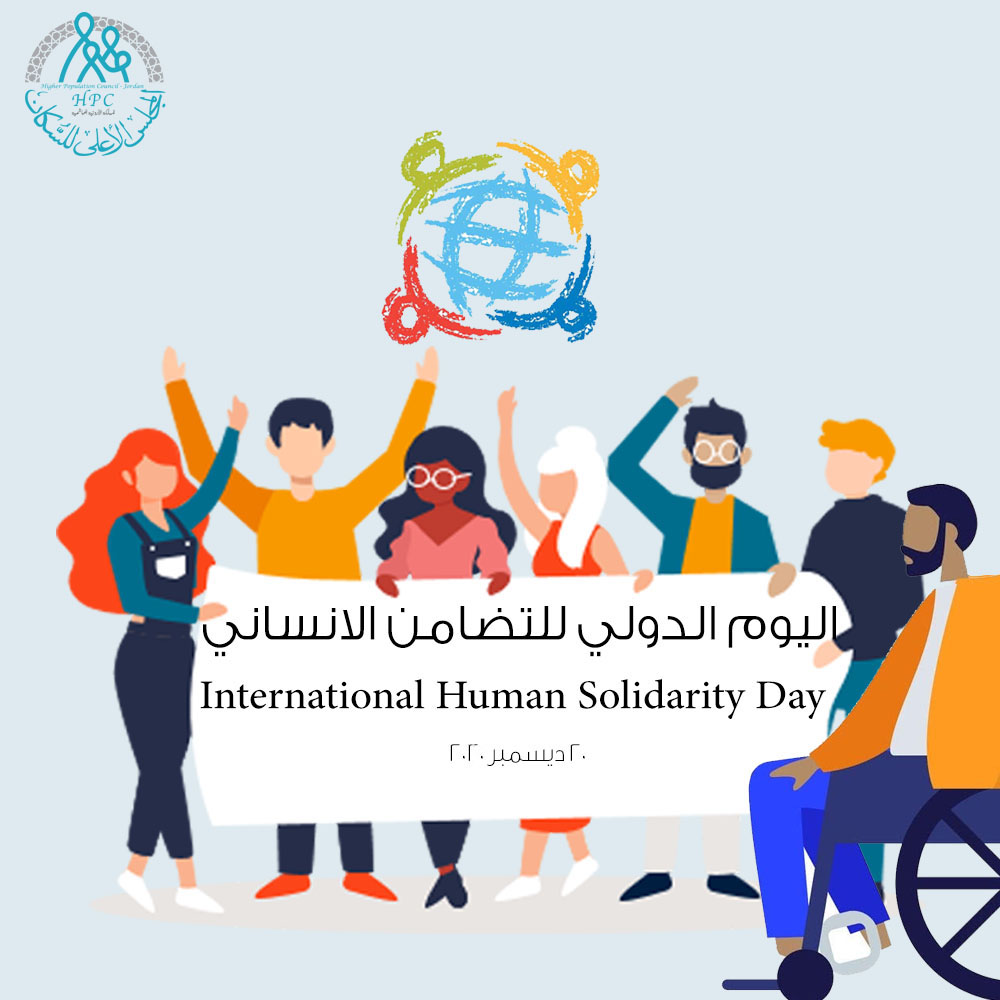

Jordan and the world mark today the International Human Solidarity Day, which aims to raise public awareness of the importance of promoting peace, human rights, economic and social development and cooperation, encourage debate on the ways to promote human solidarity for the achievement of the Sustainable Development Goals, remind governments to respect their commitments to international agreements and conventions. This day also encourages new initiatives for poverty eradication.
HPC Secretary General, Dr. Abla Amawi, said on this occasion that in the light of current global conditions and the Covid-19 outbreak, there is a genuine need for human solidarity and intensified efforts to achieve safety, stability, peace and health.
Amawi explained that HPC played a notable role in supporting government efforts to strengthen the rapid response to the Covid-19 pandemic, by preparing and submitting to decision-makers in-depth studies on the impact of the pandemic on different segments, sectors, and particularly the most vulnerable groups of society, to help inform strategic planning to address its consequences. HPC also played a vital role by shedding light on the different characteristics of the population, to help identify the gaps and priorities that must be taken into account when formulating future plans for crisis management and support the different groups of society.
Amawi added that national institutions in Jordan had an important role in human solidarity during the Covid-19 pandemic and the related lockdowns that affected citizens in general. Based on the directives of His Majesty King Abdullah II bin Al Hussein, several solidarity platforms were established, such as the "Himmat Watan" Fund. Also with the support and directives of His Majesty, the Ministry of Social Development and the National Aid Fund formulated detailed criteria to target households that need assistance and support them through the social protection program of the National Aid Fund, as well as the program to support daily-paid workers and informal labor. The Social Security Corporation also played a vital role by disbursing an unemployment allowance to unemployed individuals, which professional associations and civil society institutions notably distributed food parcels, provided medical aid and psychological counseling for domestic and gender-based violence victims, provided rehabilitation and support for persons with disabilities, among other things.
Being part of this world, Jordan is faced by major social, economic and health challenges due to the pandemic, many of which are directly linked to demographics, the age - gender structure and mortality rate of the population. In this regard, Amawi stressed the need for concerted action to find solutions to these challenges, especially poverty, unemployment, and weak economic participation of women, and to promote technical and vocational work. According to the latest Household Income and Expenditures Survey carried out by the Department of Statistics (2017-2018), absolute poverty reached 15.7%, representing 1.069 million Jordanians, (extreme) hunger poverty stood at 0.12%, representing 7993 Jordanians, the poverty gap reached 3.5%, while the severity of poverty was 1.2%.
Amawi confirmed Jordan’s commitment to ensure a healthy life and an appropriate social environment for all citizens, by adopting advanced protection mechanisms to deal with economic, social and health risks, and successfully implementing different programs in this field.
Amawi gave three examples of issues that require global efforts and a show of solidarity, including solidarity with the Palestinian people and the need to fulfil our collective and unfinished mission to reach a solution for the Palestinian issue. Another example, is the urgent need to address the serious health, social, economic and humanitarian consequences that refugees face due to social, psychological and political instability and the need to meet the basic needs of refugees by conducting systematic scientific research and formulating comprehensive social protection policies. The third issue is international solidarity to confront the repercussions of the Covid-19 pandemic.
Amawi said that Jordan is a firm believer in the importance of human solidarity in various fields, and has provided assistance to many countries that have been hit by crises and natural disasters in the Arab region and around the world. One example is the military field hospital that Jordan sent to Lebanon in response to the Beirut port explosion, complete with medical teams of all specialties. Jordan also provides continuous aid to the Palestinian people through field hospitals and in-kind and financial assistance, and sent medical supplies by airplane to the United States of America during the Covid-19 pandemic.
Amawi indicated that Jordan strives with governments of the World to promote human solidarity and strengthen global security to enhance resilience in the face of destabilizing factors and advance the economy. Locally, Jordan seeks to enhance women’s role and shows solidarity with them by looking into the issue of granting citizenship to children of Jordanian women to achieve equality between Jordanian men and women.







